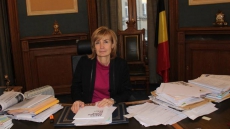BEIJING — Surgeons from around the world gathered at a conference in Beijing on Monday in China's latest effort to fight persistent skepticism about whether its hospitals have stopped performing transplants with the organs of executed prisoners.
Doctors from the World Health Organization and the Montreal-based Transplantation Society who were invited to the conference by China praised Chinese officials for reforms they have made in the transplant system, including a ban put in place last year on using organs from executed inmates.
Doubts persist that China is accurately reporting figures or meeting its pledge given its severe shortage of organ donors and China's long-standing black-market organ trade. By its own figures, China has one of the lowest rates of organ donation in the world, and even the system's advocates say it needs hundreds of additional hospitals and doctors.
While China suppresses most discussions about human rights, government officials and state media have publicly talked about their commitment to ending a practice opposed by doctors and human rights groups due to fears that it promotes executions and coercion.
In a sign of the issue's symbolic importance to China, the conference took place in an ornate, chandeliered ballroom inside the Great Hall of the People, the building next to Tiananmen Square that typically hosts foreign leaders and ceremonial Communist Party events.
Doctors at the conference Monday described meeting patients and visiting hospitals around the country, and said the recorded usage of drugs given to transplant patients lined up with China's reported numbers of transplants.
Dr. Jose Nunez, an adviser on organ transplants to the World Health Organization, told the audience that he believed China was building the "next great" system.
"You are taking this country to a leading position within the transplantation world," he said.
Others offered praise for Chinese officials, but stopped short of saying whether they could confirm China had stopped using executed inmates' organs.

"It's not a matter for us to prove to you that it's zero," said Dr. Francis Delmonico, a longtime surgeon and a professor at Harvard Medical School. "It's a matter for the government to fulfil what is the law, just as it is in the other countries of the world that we go to."
China is believed to perform more executions than any other country, though the government does not disclose how many.
The former vice minister of health, Dr. Huang Jiefu, publicly acknowledged in 2005 that China harvested executed inmates' organs for transplant, and a paper he co-authored six years later reported that as many as 90 per cent of Chinese transplant surgeries using organs from dead people came from those put to death.
Huang has also responded to a report earlier this year that a Canadian patient apparently received a kidney from an executed inmate by announcing that the doctor and the hospital in question were suspended from performing more transplants.
A key impediment is that members of a donor's immediate family have the right to veto any transplant once the person is dead. There is also a traditional aversion to the removal of body parts from the dead and a fear that donated organs could be exploited for monetary gain.
Dr. Philip O'Connell, the immediate past president of the Transplantation Society, told reporters later that he would work with doctors supporting reform in any country.
"The options are that you completely isolate someone, which means that generally their practices get compounded, or you engage with them and you tell them your point of view and explain why it would be better for them to change," O'Connell said. "That is, I think in the simple terms, what we're doing."



